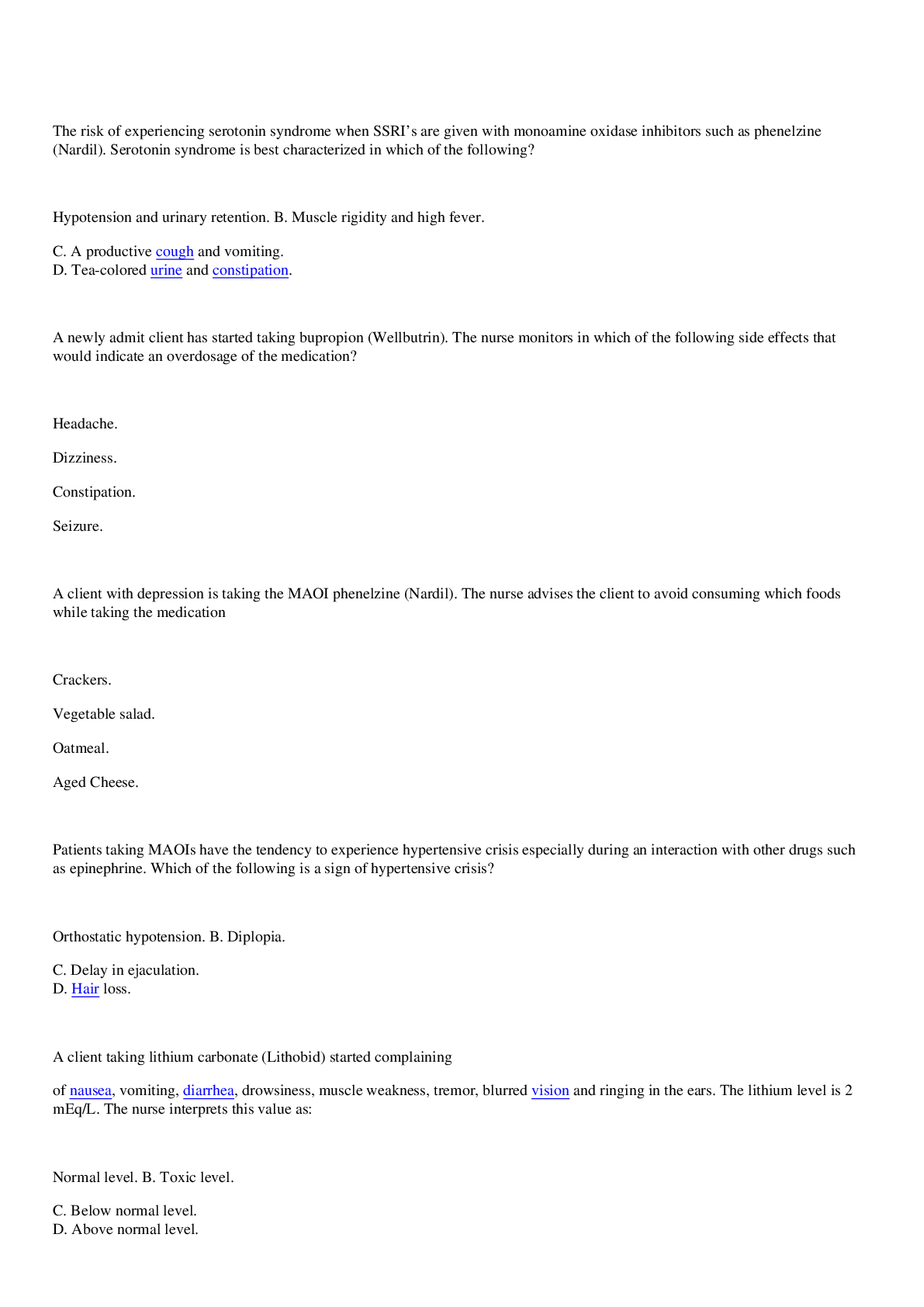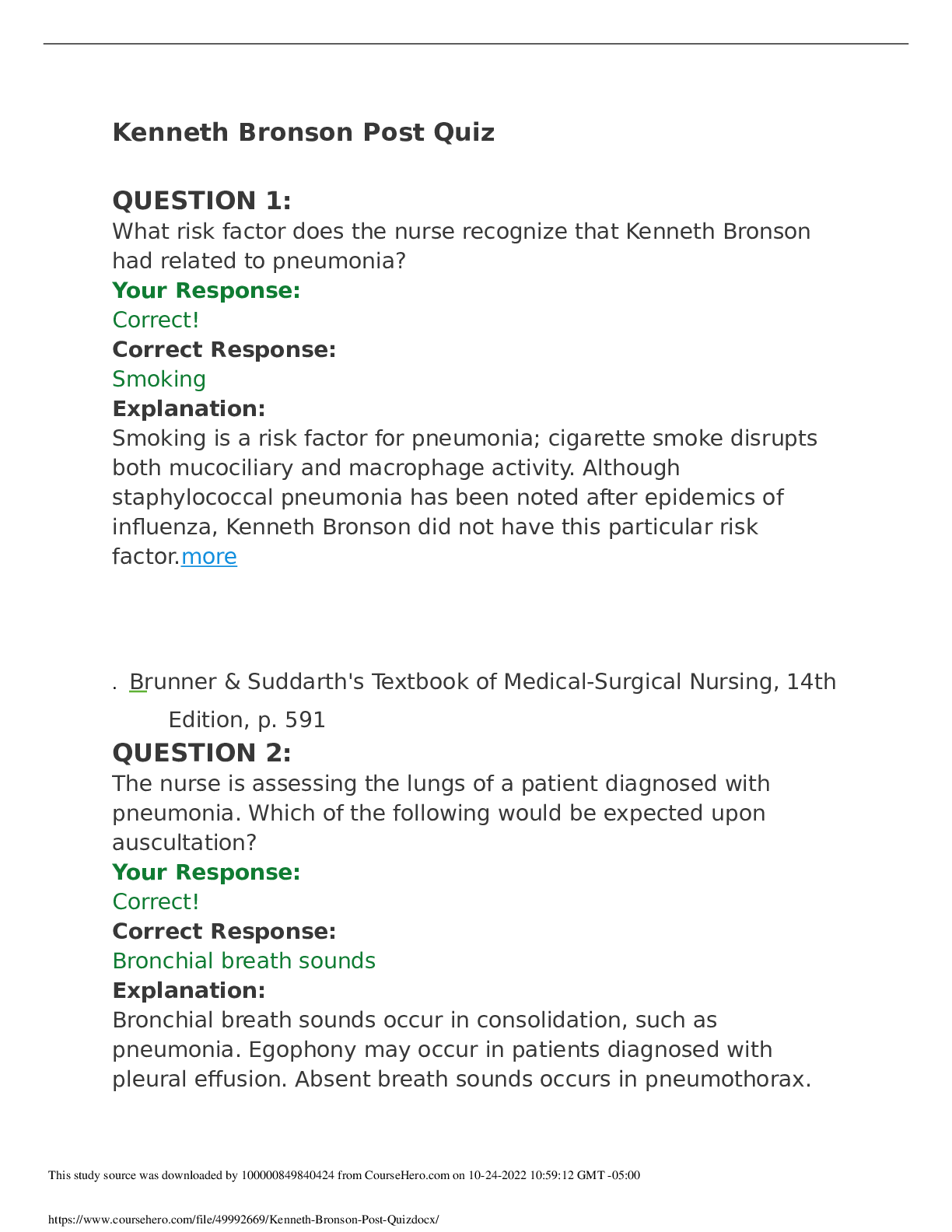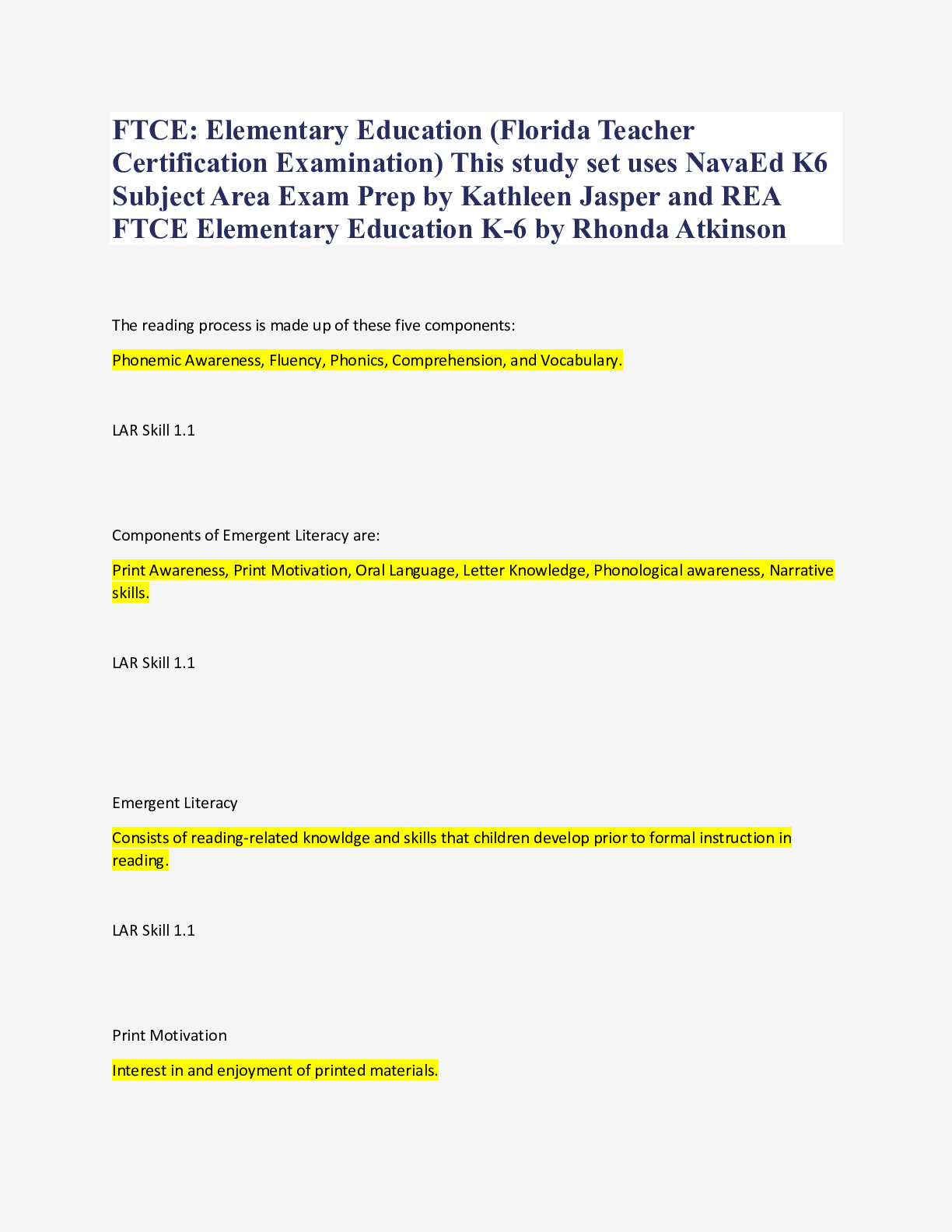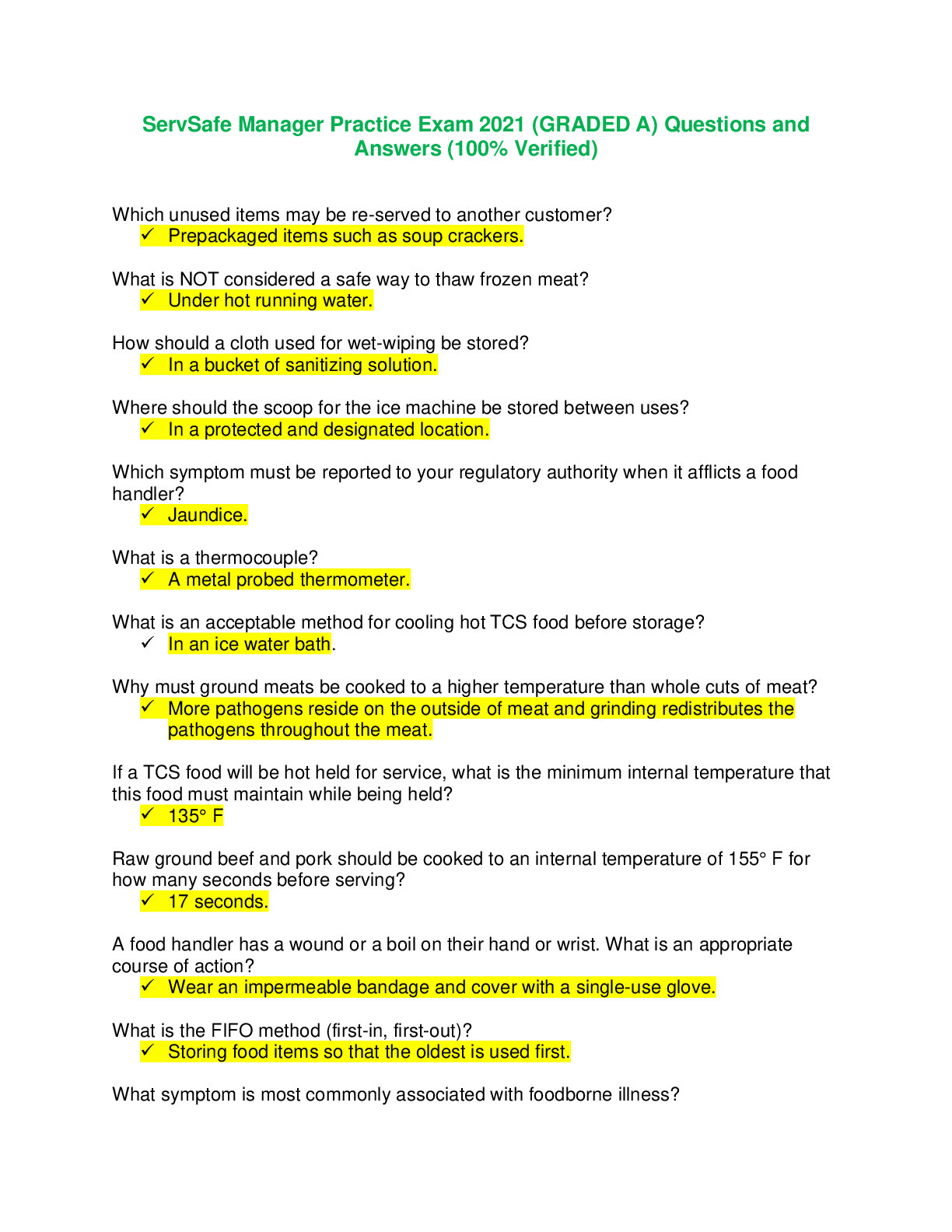NUR 256 units 3,4,5 practice questions and Answers (100% CORRECT)
Document Content and Description Below
NUR 256 units 3,4,5 practice questions 1. The risk of experiencing serotonin syndrome when SSRI’s are given with monoamine oxidase inhibitors such as phenelzine (Nardil). Serotonin syndrome is ... best characterized in which of the following? A. Hypotension and urinary retention. B. Muscle rigidity and high fever. C. A productive cough and vomiting. D. Tea-colored urine and constipation. 2. A newly admit client has started taking bupropion (Wellbutrin). The nurse monitors in which of the following side effects that would indicate an overdosage of the medication? A. Headache. B. Dizziness. C. Constipation. D. Seizure. 3. A client with depression is taking the MAOI phenelzine (Nardil). The nurse advises the client to avoid consuming which foods while taking the medication A. Crackers. B. Vegetable salad. C. Oatmeal. D. Aged Cheese. 4. Patients taking MAOIs have the tendency to experience hypertensive crisis especially during an interaction with other drugs such as epinephrine. Which of the following is a sign of hypertensive crisis? A. Orthostatic hypotension. B. Diplopia. C. Delay in ejaculation. D. Hair loss. 5. A client taking lithium carbonate (Lithobid) started complaining of nausea, vomiting, diarrhea, drowsiness, muscle weakness, tremor, blurred vision and ringing in the ears. The lithium level is 2 mEq/L. The nurse interprets this value as: A. Normal level. B. Toxic level. C. Below normal level. D. Above normal level. 6. A nurse is giving instructions to a client receiving lithium citrate. The nurse tells the client to do which of the following to prevent lithium toxicity: A. Avoid becoming dehydrated during exercise. B. Instruct the client to change positions slowly. C. Restrict salt intake in the diet. (keep the same) D. Limit fluid intake. (keep the same) 7. A nurse is giving instructions to a client taking the second generation antipsychotic, risperidone (Risperdal). The nurse advises the client to which of the following? A. Take it on an empty stomach. B. Change position slowly. (A lot of the 2nd gen antipsychotics casue orthostatic hypotension) C. Get a daily source of sunlight. D. Discontinue medication once the symptoms went away. 8. A nurse notes that a client with schizophrenia and receiving an antipsychotic medication is having uncontrolled movement of the lips and tongue. The nurse determines that the client is experiencing? A. Hypertensive crisis. B. Parkinsonism. C. Tardive dyskinesia. D. Neuroleptic malignant syndrome. 9. A client with schizophrenia has been started on medication therapy with clozapine (Clozaril). A nurse assesses the results of which laboratory study to monitor for adverse effect related to this medication? A. White blood cell. B. Platelet count. C. Liver function studies. D. Random blood sugar. 10. Methylphenidate (Ritalin) is prescribed to an 8-year-old child for the treatment of attention deficit hyperactivity disorder (ADHD). The nurse will most likely monitor which of the following during the medication therapy? A. Deep tendon reflex. B. Intake and output. C. Temperature and breath sound. D. Height and weight. 11. A client who has been taking buspirone (BuSpar) for two months returns to the clinic for a follow-up. The nurse determines that the medication is effective if there is an absent display of? A. Feelings of panic, fear, and uneasiness. B. Thought broadcasting or delusions. C. Paranoid and suicidal thought process. D. Alcohol withdrawal symptoms. 12. Tranylcypromine sulfate (Parnate) an MOAI is prescribed for a depressed client who has not responded to the tricyclic antidepressants. After teaching the client about the medication, Nurse Marian evaluates that learning has occurred when the client states, “I will avoid: A. Citrus fruit, tuna, and yellow vegetables.” B. Chocolate milk, aged cheese, and yogurt” C. Green leafy vegetables, chicken, and milk.” D. Whole grains, red meats, and carbonated soda.” 13. Which information is most important for the nurse Trinity to include in a teaching plan for a male schizophrenic client taking clozapine (Clozaril)? A. Monthly blood tests will be necessary. B. Report a sore throat or fever to the physician immediately. C. Blood pressure must be monitored for hypertension. D. Stop the medication when symptoms subside. 14.A supervisor observes inconsistency in the psychiatric-mental health nurse's behavior toward a patient; the nurse is unreasonably concerned, overly kind, or irrationally hostile. The most appropriate explanation is that the nurse is displaying: A. Countertransference. B. Empathic resonance. C. splitting behavior. D. Transference. 15. The severe feeling of restlessness produced by some psychotropic medications, which is often misinterpreted by patients as anxiety or a recurrence of psychiatric symptoms, is known as: A. akathisia. B. akinesia. C. bradykinesia. D. dystonia. 16. A patient is being discharged after spending six days in the hospital, due to depression with suicidal ideation. The psychiatric-mental health nurse knows that an important outcome has been met when the patient states: A. "I can't wait to get home and forget that this ever happened." B. "I feel so much better. If I continue to feel this way, I can probably stop taking my medications soon." C. "I have a list of support groups and a crisis line that I can call, if I feel suicidal." D. "I have to leave here soon, if I want to make it to the shelter before they run out of beds." 17.. When assessing a female client who is receiving tricyclic antidepressant therapy, which of the following would alert the nurse to the possibility that the client is experiencing anticholinergic effects? A. Urine retention and blurred vision B. Respiratory depression and convulsion C. Delirium and Sedation D. Tremors and cardiac arrhythmias 18. When developing the plan of care for a client receiving haloperidol a first generation antipsychotic, which of the following medications would nurse Monet anticipate administering if the client developed extrapyramidal side effects? A. Olanzapine (Zyprexa) B. Paroxetine (Paxil) C. Benztropine mesylate (Cogentin) D. Lorazepam (Ativan) 19. A client receiving haloperidol (Haldol) a first-generation antipsychotic complains of a stiff jaw and difficulty swallowing. The nurse’s first action is to: A. reassure the client and administer as needed lorazepam (Ativan) I.M. B. administer as needed dose of benztropine (Cogentin) I.M. as ordered. C. administer as needed dose of benztropine (Cogentin) by mouth as ordered. D. administer as needed dose of haloperidol (Haldol) by mouth. 20.. A dystonic reaction can be caused by which of the following medications? A. diazepam (Valium) B. haloperidol (Haldol) C. amitriptyline (Elavil) D. clonazepam (Klonopin) 21.. A client with schizophrenia who receives fluphenazine (Prolixin) develops pseudo parkinsonism and akinesia. What drug would the nurse administer to minimize extrapyramidal symptoms? A. benztropine (Cogentin) B. dantrolene (Dantrium) C. clonazepam (Klonopin) D. diazepam (Valium) 22. A client with chronic schizophrenia receives 20 mg of fluphenazine decanoate (Prolixin Decanoate) by I.M. injection. Three days later, the client has muscle contractions that contort the neck. This client is exhibiting which extrapyramidal reaction? A. Dystonia B. Akinesia C. Akathisia D. Tardive dyskinesia 23.A prescription for which mood stabilizing medication would require the nurse to monitor the client for potential development of the side effect of hypothyroidism? A. Fluoxetine B. Bupropion C. Lithium D. Imipramine 24.. A patient taking medication for mental Schizophrenia develops restlessness and an uncontrollable need to be in motion. Which drug action causes these symptoms to develop? A. Anticholinergic effects B. Dopamine-blocking effects C. Endocrine-stimulating effects D. Ability to stimulate spinal nerves 25, A 49-year-old patient diagnosed with schizophrenia at 22 years old is prescribed risperidone. Which nursing assessment is the priority for this patient? A. Monitoring blood levels to avoid toxicity B. Monitoring for abnormal involuntary movements C. Observing for secondary mania D. Observing for memory changes 26. A client diagnosed with schizophrenia is admitted to an acute care psychiatric unit. Which clinical findings indicate positive signs and symptoms associated with schizophrenia? 1. Withdrawal, poverty of speech, inattentiveness 2. Flat affect, decreased spontaneity, asocial behavior 3. Hypomania, labile mood swings, episodes of euphoria 4. Hyperactivity, auditory hallucinations, loose associations 27. As a nurse enters a room and approaches a client diagnosed with schizophrenia, the client states, “Get out of here before I hit you—go away.” The nurse concludes that this aggressive behavior is probably related to the fact that the client felt 1. that voices were directing the behavior. 2. trapped when the nurse walked into the room. 3. afraid of doing harm to the nurse if the nurse came closer. 4. that nurse was similar to someone who was previously frightening 28. What should the nurse identify as the foremost basis for the development of schizophrenia? 1. Biologic perspective 2. Seasonal approach 3. Immunologic basis 4. Psychoanalytic perspective 29. A client is admitted to the mental health unit because of a progressively increasing depression over the past month. What clinical finding does a nurse expect during the initial assessment of the client? 1. Elated affect related to reaction formation 2. Loose associations related to thought disorder 3. Physical exhaustion resulting from decreased physical activity 4. Diminished verbal expression caused by slowed thought processes 30. A nurse is planning care for a depressed client. Which approach is most therapeutic? 1. Allowing the client time and placing few demands 2. Helping the client focus on the family support system 3. Encouraging the client to perform menial, repetitious tasks 4. Telling the client repeatedly that the staff views the client as worthwhile 31. What is most appropriate for a nurse to say when interviewing a newly admitted depressed client whose thoughts focus on feelings of worthlessness and failure? 1. “Tell me how you feel about yourself.” 2. “Tell me what has been bothering you.” 3. “Why do you feel so bad about yourself?” 4. “What can we do to help you when you are here?” 32. A client whose depression is beginning to lift remains aloof from the other clients on the mental health unit. How can a nurse help the client to participate in an activity? 1. Find solitary pursuits that the client can enjoy 2. Speak to the client about the importance of entering into activities 3. Ask the health care provider to speak to the client about participating 4. Invite another client to take part in a joint activity with the nurse and the client 33.. Which activity is most appropriate for a nurse to introduce to a depressed client during the early part of hospitalization? 1. Board game 2. Project involving drawing 3. Small aerobic exercise group 4. Card game with three other clients 34. A withdrawn client refuses to get out of bed and becomes upset when asked to do so. What nursing action is most therapeutic? 1. Require the client to get out of bed 2. Stay with the client until the client calms down 3. Give the client the prn antipsychotic that is prescribed 4. Leave the client alone in bed for as long as the client wishes 35. A depressed client is concerned about many fears that are upsetting and frightening and expresses a feeling of having committed the “unpardonable sin.” Which of the following is the most therapeutic response? 1. “Your family loves you very much.” 2. “You do understand that you really are not a bad person.” 3. “You know these feelings are in your imagination and are not true.” 4. “Your thoughts are part of your illness and will change as you improve.” 36. A nurse sits with a depressed client twice a day, although there is little verbal communication. One afternoon, the client asks, “Do you think they’ll ever let me out of here?” What is the nurse’s best reply? 1. “We should ask your doctor.” 2. “Everyone says you’re doing fine.” 3. “Do you think you are ready to leave?” 4. “How do you feel about leaving here?” 37. A nurse is working with a client diagnosed with a major depressive episode. What is a long- term goal for this client? 1. Talk openly about the depressed feelings 2. Identify and use new defense mechanisms 3. Discuss the unconscious source of the anger 4. Verbalize realistic perceptions of self and others 38. What is the best nursing intervention when the language of a client in the manic phase of a bipolar disorder becomes vulgar and profane? 1. State, “We do not like that kind of talk around here” 2. Ignore it because the client is using it to gain attention 3. Recognize that the behavior is part of the illness, but set limits on it 4. State, “We will talk to you when you can speak in an acceptable way” 38. A client diagnosed with bipolar disorder, manic episode, has a superior, authoritative manner and constantly instructs other clients about how to dress, what to eat, and where to sit. The nurse should intervene because these behaviors eventually will cause the other clients to feel: 1. angry. 2. dependent. 3. inadequate. 4. ambivalent. 39. What is essential for the nurse to do when approaching a client during a period of overactivity? 1. Use a firm but caring and consistent approach 2. Anticipate and physically control the hyperactivity 3. Allow the client to choose the activities in which to participate 4. Let the client know the staff will not tolerate destructive behavior 40. What should the nurse include when developing a plan of care for a client in the manic phase of bipolar disorder? 1. Focus the client’s interest in reality 2. Encourage the client to talk as much as needed 3. Redirect the client’s excess energy to constructive channels 4. Persuade the client to complete any task that has been started [Show More]
Last updated: 2 years ago
Preview 1 out of 8 pages

Buy this document to get the full access instantly
Instant Download Access after purchase
Buy NowInstant download
We Accept:

Reviews( 0 )
$14.50
Can't find what you want? Try our AI powered Search
Document information
Connected school, study & course
About the document
Uploaded On
Jan 10, 2022
Number of pages
8
Written in
Additional information
This document has been written for:
Uploaded
Jan 10, 2022
Downloads
0
Views
64





 Questions and Answers 100% VERIFIED.png)
 Questions and Answers 100% correct Solutions.png)



















